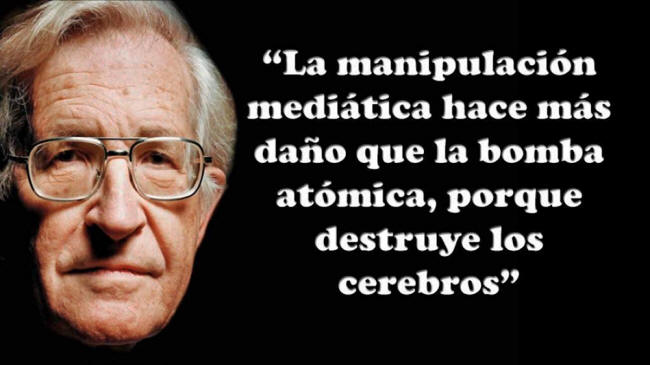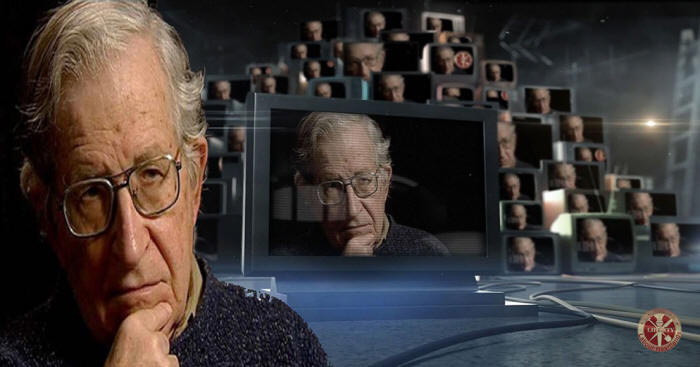
por Omar Montilla
5 Septiembre, 2010
del Sitio Web
Gramscimania
Versión en Ingles
|
Noam Chomsky
elaboró la lista
de las
"10 Estrategias
de Manipulación"
a través de los
medios. |

-
La estrategia de la distracción
El elemento primordial del control social es la estrategia de la distracción
que consiste en desviar la atención del público de los problemas importantes
y de los cambios decididos por las elites políticas y económicas, mediante
la técnica del diluvio o inundación de continuas distracciones y de
informaciones insignificantes.
La estrategia de la distracción es igualmente
indispensable para impedir al público interesarse por los conocimientos
esenciales, en el área de la ciencia, la economía, la psicología, la
neurobiología y la cibernética.
-
"Mantener la Atención del público distraída, lejos de los verdaderos
problemas sociales, cautivada por temas sin importancia real. Mantener al
público ocupado, ocupado, ocupado, sin ningún tiempo para pensar; de vuelta
a granja como los otros animales (cita del texto 'Armas silenciosas para
guerras tranquilas)".
-
Crear problemas y después ofrecer soluciones
Este método también es llamado
"problema-reacción-solución".
Se crea un
problema, una "situación" prevista para causar cierta reacción en el público,
a fin de que éste sea el mandante de las medidas que se desea hacer aceptar.
Por ejemplo: dejar que se desenvuelva o se intensifique la violencia urbana,
u organizar atentados sangrientos, a fin de que el público sea el demandante
de leyes de seguridad y políticas en perjuicio de la libertad.
O también:
crear una crisis económica para hacer aceptar como un mal necesario el
retroceso de los derechos sociales y el desmantelamiento de los servicios
públicos.
-
La estrategia de la gradualidad
Para hacer que se acepte una medida inaceptable, basta aplicarla
gradualmente, a cuentagotas, por años consecutivos.
Es de esa manera que
condiciones socioeconómicas radicalmente nuevas (neoliberalismo) fueron
impuestas durante las décadas de 1980 y 1990:
...tantos cambios que hubieran provocado una revolución si
hubiesen sido aplicadas de una sola vez.
-
La estrategia de diferir
Otra manera de hacer aceptar una decisión impopular es la de presentarla
como "dolorosa y necesaria", obteniendo la aceptación pública, en el momento,
para una aplicación futura.
Es más fácil aceptar un sacrificio futuro que un
sacrificio inmediato.
-
Primero, porque el esfuerzo no es empleado
inmediatamente.
-
Luego, porque el público, la masa, tiene siempre la
tendencia a esperar ingenuamente que "todo irá mejorar mañana" y que el
sacrificio exigido podrá ser evitado.
Esto da más tiempo al público para
acostumbrarse a la idea del cambio y de aceptarla con resignación cuando
llegue el momento.
-
Dirigirse al público como criaturas de poca edad
La mayoría de la publicidad dirigida al gran público utiliza discurso,
argumentos, personajes y entonación particularmente infantiles, muchas veces
próximos a la debilidad, como si el espectador fuese una criatura de poca
edad o un deficiente mental.
Cuanto más se intente buscar engañar al
espectador, más se tiende a adoptar un tono infantilizante.
Por qué?
-
"Si uno
se dirige a una persona como si ella tuviese la edad de 12 años o menos,
entonces, en razón de la sugestionabilidad, ella tenderá, con cierta
probabilidad, a una respuesta o reacción también desprovista de
un sentido crítico como la de una persona de 12 años o menos de
edad.
(ver "Armas
silenciosas para guerras tranquilas")".
-
Utilizar el aspecto emocional mucho más que la reflexión
Hacer uso del aspecto emocional es una técnica clásica para causar un corto
circuito en el análisis racional, y finalmente al sentido critico de los
individuos.
Por otra parte, la utilización del registro emocional permite
abrir la puerta de acceso al inconsciente para implantar o injertar ideas,
deseos, miedos y temores, compulsiones, o inducir comportamientos…
-
Mantener al público en la ignorancia y la mediocridad
Hacer que el público sea incapaz de comprender las tecnologías y los métodos
utilizados para su control y su esclavitud.
-
"La calidad de la
educación dada a las clases sociales inferiores debe ser la más
pobre y mediocre posible, de forma que la distancia de la
ignorancia que planea entre las clases inferiores y las clases
sociales superiores sea y permanezca imposibles de alcanzar para
las clases inferiores."
("Armas
silenciosas para guerras tranquilas")
-
Estimular al público a ser complaciente con la mediocridad
Promover al público a creer que es moda el hecho de ser estúpido, vulgar e
inculto…
-
Reforzar la autoculpabilidad
Hacer creer al individuo que es solamente él el culpable por su propia
desgracia, por causa de la insuficiencia de su inteligencia, de sus
capacidades, o de sus esfuerzos.
Así, en lugar de rebelarse contra el
sistema económico, el individuo se auto-desvalida y se culpa, lo que genera
un estado depresivo, uno de cuyos efectos es la inhibición de su acción.
Y,
sin acción, no hay revolución!
-
Conocer a los individuos mejor de lo que ellos mismos se conocen
En el transcurso de los últimos 50 años, los avances acelerados de la
ciencia han generado una creciente brecha entre los conocimientos del
público y aquellos poseídas y utilizados por las elites dominantes.
Gracias
a la biología, la neurobiología y la psicología aplicada, el "sistema" ha
disfrutado de un conocimiento avanzado del ser humano, tanto de forma física
como psicológicamente.
El sistema ha conseguido conocer mejor al individuo
común de lo que él se conoce a sí mismo.
Esto significa que, en la mayoría
de los casos, el sistema ejerce un control mayor y un gran poder sobre los
individuos, mayor que el de los individuos sobre sí mismos.
-
Noam Chomsky -
Top 10 Media Manipulation Strategies
January 2011
from
Scribd
Website
Spanish version

Renowned critic and always MIT linguist
Noam Chomsky, one of the classic
voices of intellectual dissent in the last decade, has compiled a list of
the ten most common and effective strategies resorted to by the agendas
"hidden" to establish a manipulation of the population through the media.
Historically the media have proven highly efficient to mold public opinion.
Thanks to the
media paraphernalia and propaganda, have been created or
destroyed social movements, justified wars, tempered financial crisis,
spurred on some other ideological currents, and even given the phenomenon of
media as producers of reality within the collective psyche.
But how to
detect the most common strategies for understanding these psychosocial tools
which, surely, we participate?
Fortunately Chomsky has been given the task
of synthesizing and expose these practices, some more obvious and more
sophisticated, but apparently all equally effective and, from a certain
point of view, demeaning.
Encourage stupidity, promote a sense of guilt,
promote distraction, or construct artificial problems and then magically,
solve them, are just some of these tactics.
-
The
strategy of distraction
The primary element of social
control is the strategy of distraction which is to divert public
attention from important issues and changes determined by the
political and economic elites, by the technique of flood or flooding
continuous distractions and insignificant information.
Distraction strategy
is also essential to prevent the public interest in the essential
knowledge in the area of the science, economics, psychology,
neurobiology and cybernetics.
-
"Maintaining
public attention diverted away from the real social problems,
captivated by matters of no real importance. Keep the public
busy, busy, busy, no time to think, back to farm and other
animals."
(quote from text
Silent Weapons for Quiet War)
-
Create problems,
then offer solutions
This method is also called
"problem -reaction- solution."
It creates a problem,
a "situation" referred to cause some reaction in the audience, so
this is the principal of the steps that you want to accept.
For example: let it
unfold and intensify urban violence, or arrange for bloody attacks
in order that the public is the applicant’s security laws and
policies to the detriment of freedom.
Or create an economic
crisis to accept as a necessary evil retreat of social rights and
the dismantling of public services.
-
The gradual
strategy
Acceptance to an unacceptable
degree, just apply it gradually, dropper, for consecutive years.
That is how they
radically new socioeconomic conditions (neoliberalism) were imposed
during the 1980s and 1990s:
...so many changes
that have brought about a revolution if they had been applied once.
-
The strategy of
deferring
Another way to accept an
unpopular decision is to present it as "painful and necessary",
gaining public acceptance, at the time for future application.
It is easier to
accept that a future sacrifice of immediate slaughter.
-
First, because
the effort is not used immediately
-
Then, because the
public, masses, is always the tendency to expect naively that
"everything will be better tomorrow" and that the sacrifice
required may be avoided
This gives the public
more time to get used to the idea of change and accept it with
resignation when the time comes.
-
Go to the public
as a little child
Most of the advertising to
the general public uses speech, argument, people and particularly
children’s intonation, often close to the weakness, as if the viewer
were a little child or a mentally deficient.
The harder one tries
to deceive the viewer look, the more it tends to adopt a tone
infantilizing.
Why?
-
"If one goes to a person as if she had the age of 12 years or
less, then, because of suggestion, she tends with a certain
probability that a response or reaction also devoid of a
critical sense as a person 12 years or younger."
(see
Silent Weapons for Quiet War)
-
Use the emotional
side more than the reflection
Making use of the emotional
aspect is a classic technique for causing a short circuit on
rational analysis, and finally to the critical sense of the
individual.
Furthermore, the use of emotional register to open the door to the
unconscious for implantation or grafting ideas , desires, fears and
anxieties , compulsions, or induce behaviors...
-
Keep the public in
ignorance and mediocrity
Making the public incapable
of understanding the technologies and methods used to control and
enslavement.
-
"The quality of
education given to the lower social classes must be the poor and
mediocre as possible so that the gap of ignorance it plans among
the lower classes and upper classes is and remains impossible to
attain for the lower classes
(See
Silent Weapons for Quiet War)."
-
To encourage the
public to be complacent with mediocrity
Promote the public to believe
that the fact is fashionable to be stupid, vulgar and uneducated…
-
Self-blame
Strengthen
To let individual blame for
their misfortune, because of the failure of their intelligence,
their abilities, or their efforts.
So, instead of
rebelling against the economic system, the individual auto-devaluate
and guilt himself, which creates a depression, one of whose effects
is to inhibit its action.
And, without action,
there is no revolution!
-
Getting to know
the individuals better than they know themselves
Over the past 50 years,
advances of accelerated science has generated a growing gap between
public knowledge and those owned and operated by dominant elites.
Thanks to biology,
neurobiology and applied psychology, the "system" has enjoyed a
sophisticated understanding of human beings, both physically and
psychologically.
The system has gotten
better acquainted with the common man more than he knows himself.
This means that, in
most cases, the system exerts greater control and great power over
individuals, greater than that of individuals about themselves.
Video
|



